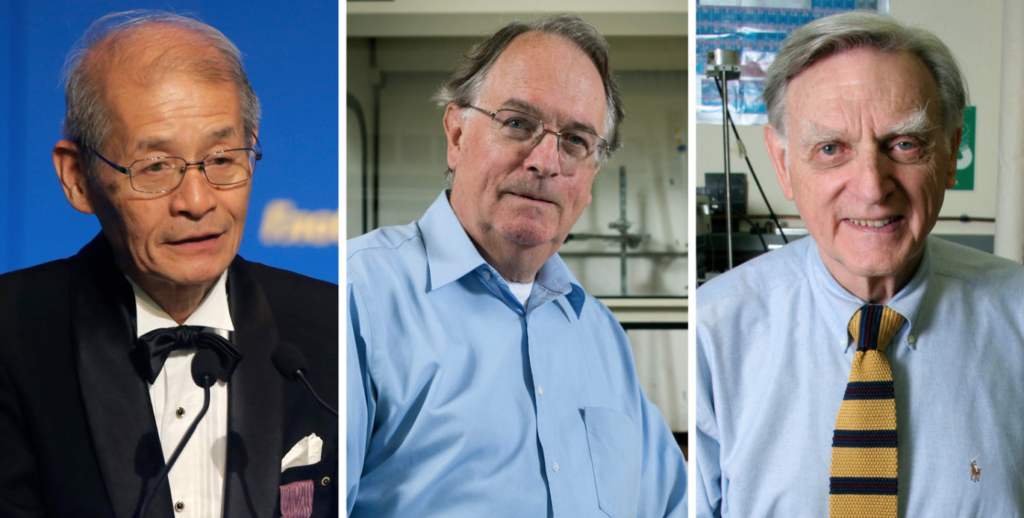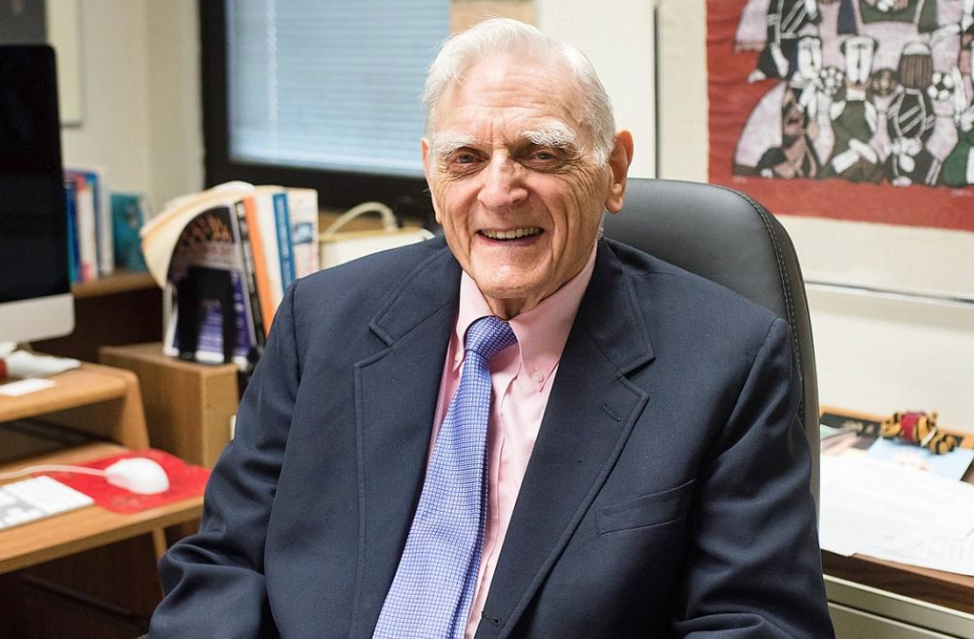A 97-year-0ld Texas college professor provided further evidence this week that some of a person’s best achievements can come late in life.
Professor John B. Goodenough, who holds faculty positions in the departments of mechanical engineering and electrical and computer engineering at the University of Texas at Austin, was awarded the Nobel Prize in chemistry for his role in the creation of the lithium-ion battery, which is now used in everything from cellphones to electric cars. He is the oldest person to ever receive a Nobel Prize.
Goodenough was one of three recipients of the Nobel Prize for their combined work on development of lithium-ion batteries. The others are Stanley Whittingham, age 77, of the State University of New York at Binghamtom, and Akira Yoshino, 71, of Meijo University in Japan.

Recipients of the 2019 Nobel Prize for chemistry, from left: Akira Yoshino, M. Stanley Whittingham, and John B. Goodenough.
The groundbreaking battery developments for which these three professors are being recognized happened years ago, mostly in the 1970s, but even then Goodenough was in his 50s. He has continued to actively work and learn and even today, in his late 90s, is still on the UT faculty. Just two years ago, Goodenough and his team at the university identified a new, safe material that can be used in batteries. When word came about the announcement, Goodenough was on his way to London to receive the Copley Medal from the Royal Society.
“I hope they (UT) keep me employed,” Goodenough joked this week in an interview with The Dallas Morning News.
Late Life Can Bring a Creative Burst and Great Achievements
The professor’s accomplishments, especially his continued work at such an advanced age, underscore the fact that there is no magic age at which one’s usefulness to society ends. Assigning an arbitrary age such as 62 or 65 at which it is assumed people should retire is a real mistake. It feeds into a stereotype that by the 60s a person is ready to “put out to pasture,” that their decades of knowledge and experience are no longer of value.
To the contrary, Goodenough, perhaps half-jokingly, made the point that old age gives a person more time to create and contribute to the world.
“Live to 97 (years old) and you can do anything,” Goodenough said in a statement to UT News.
People Don’t have ‘Use By’ Dates
Society, including employers, needs to rethink our attitudes and practices toward senior adults. We are losing out on valuable contributions that seniors might continue making if encouraged to stay in the mainstream of life. As discussed in other posts on this blog (see links at the end of this story), you don’t have to look far to find senior adults who are still high achievers. They range from Warren Buffett, president of Berkshire Hathaway, who at age 89 is still one of the most sought-after investors in America, to entertainer Betty White, also 97.
Employers, in particular, need to consider ways to accommodate employees as they age. This may mean being more open to part-time or flexible-hours schedules, or possibly granting more time off. What some older employees may lack in physical strength and stamina is more than made up by the decades of knowledge they carry inside.
Just think about how society might benefit from more actively engaged senior adults. In Professor Goodenough’s case, his contributions to lithium-ion batteries are being credited with helping reduce dependence on fossil fuels and thereby improving the environment.
The Nobel Foundation praised the three professors’ work for ushering in a rechargeable society:
“Lithium-ion batteries have revolutionised our lives since they first entered the market in 1991. They have laid the foundation of a wireless, fossil fuel-free society, and are of the greatest benefit to humankind,” said the Nobel Foundation in a statement.
What might your contribution to society be beyond age 65? If you’ve got ideas and dreams and the good health to pursue them, don’t let anyone convince you that you’re “too old” to go for it. The world, or at least your small corner of it, will be better off as a result.
Read these related stories:
Best Achievements Often Happen Late in Life
For Sojourners, Retirement is a Time for Service to Others
Why Retirement May Be the Best Stage of Life
Photo credits:
University of Oxford, ox.ac.uk
Dmitry Lovetsky; Jonathan Cohen/Binghamton University; The University of Texas at Austin via AP
Love this story? Sign up below to receive future blog post from This Retirement Life, sent to your email box, free of charge, AND receive a copy of our NEW chart comparing the Top 20 Retirement States. This chart is only available to subscribers.
Do you have comments to share about this story? We’d love to hear from you. Scroll down to add your comments below.









